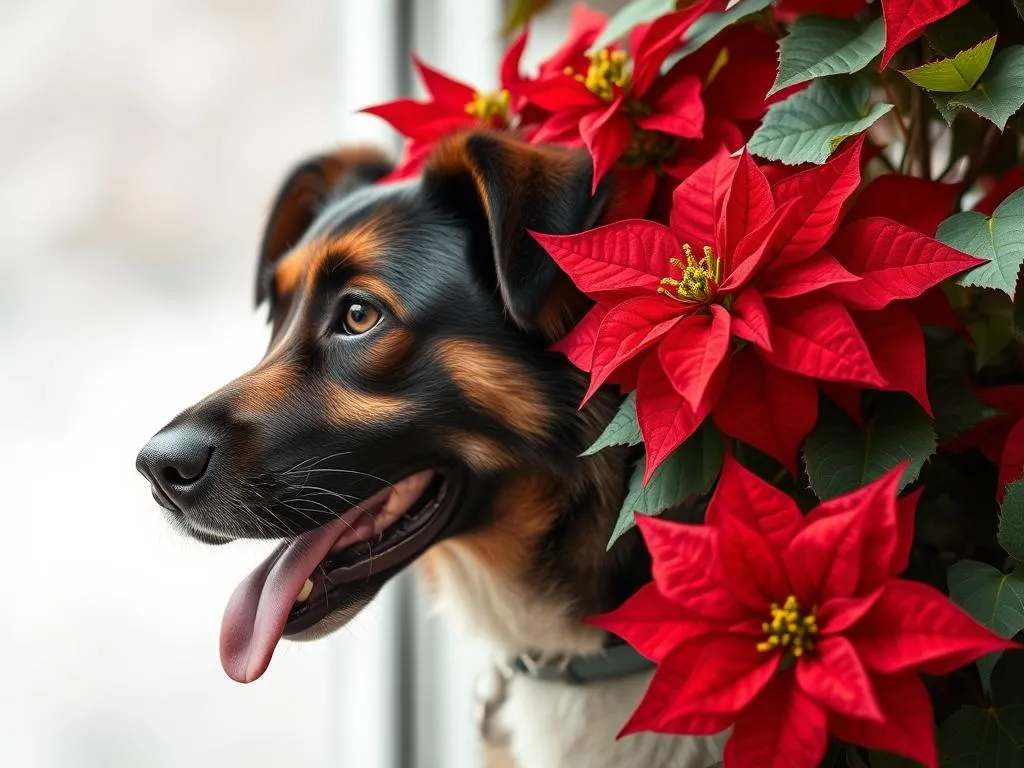
Introduction
As pet owners, ensuring the health and safety of our dogs is paramount, especially during the festive season when our homes are adorned with seasonal decorations. Understanding potential hazards in our environment is crucial for preventing accidents and health issues in our furry companions. One common concern during the holidays is the question of whether poinsettias are poisonous to dogs. This article aims to clarify this issue while providing additional information on keeping your dog safe during the holiday season.
Understanding Dog Toxicity
What is Toxicity?
Toxicity refers to the degree to which a substance can harm living organisms, including animals like dogs. Different substances can affect dogs in various ways, depending on their chemical composition and the amount ingested. Some plants, foods, and household items contain compounds that can be toxic to dogs, leading to adverse health effects.
Common Symptoms of Poisoning in Dogs
Being aware of the signs of poisoning is critical for every dog owner. Symptoms can vary based on the toxin involved but often include:
- Vomiting
- Diarrhea
- Lethargy
- Loss of appetite
- Excessive drooling
- Tremors or seizures
Recognizing these symptoms quickly can be the difference between a minor issue and a serious health crisis, underscoring the need for vigilance among pet owners.
Poinsettias: A Holiday Staple
Background Information
Poinsettias are a popular decorative plant during the holiday season, often associated with Christmas celebrations. Originating from Mexico, these vibrant plants have become a symbol of the holidays in many cultures. However, there are misconceptions surrounding their safety for pets, particularly dogs.
The Plant’s Characteristics
Poinsettias are characterized by their vibrant red and green foliage, which adds a festive touch to any home. The plant thrives in warm climates and is frequently found in homes, offices, and public spaces during the holiday season. Despite their beauty, it’s important for pet owners to understand their potential risks.
Are Poinsettias Poisonous to Dogs?
Toxic Components of Poinsettias
Poinsettias contain a milky, white latex-like sap that can be irritating to the mouth and stomach of dogs if ingested. The plant also contains compounds known as euphorbia, which can lead to discomfort but are generally not considered life-threatening.
Severity of Toxicity
Research suggests that the toxicity of poinsettias is relatively low compared to other common plants known to be harmful to dogs. While ingestion can cause mild gastrointestinal upset, the symptoms are typically self-limiting. According to the ASPCA, poinsettias are classified as mildly toxic, meaning they can cause irritation but are unlikely to cause severe health issues.
Veterinary Perspectives
Veterinarians generally agree that while poinsettias are not highly toxic to dogs, caution should still be exercised. If a dog ingests a significant amount of the plant, symptoms may manifest, prompting pet owners to monitor their dog’s behavior closely. Recommendations often include removing the plant from the dog’s reach and consulting a veterinarian if there are any concerns.
What to Do If Your Dog Ingests Poinsettias
Immediate Steps to Take
If you suspect that your dog has ingested poinsettias, it’s essential to stay calm and assess the situation. Here are the steps to follow:
- Remove any remaining plant material to prevent further consumption.
- Observe your dog for any symptoms such as vomiting or lethargy.
- Contact your veterinarian for advice, especially if your dog shows signs of distress.
When to Contact a Veterinarian
It’s crucial to contact a veterinarian if your dog exhibits severe symptoms such as:
- Persistent vomiting or diarrhea
- Signs of dehydration
- Severe lethargy or weakness
- Difficulty breathing
Additionally, having the contact information for local poison control hotlines and emergency veterinary services readily available can be invaluable in such situations.
Safe Holiday Practices for Dog Owners
Choosing Pet-Safe Decorations
To ensure a festive yet safe environment for your dog, opt for holiday plants that are non-toxic. Some dog-friendly alternatives include:
- Christmas cactus
- Bamboo palm
- Spider plant
These plants can add beauty to your home without posing a risk to your pet’s health.
Creating a Safe Environment
Creating a safe space for your dog during the holidays involves several strategies:
- Limit access to holiday decorations and plants.
- Supervise your dog when guests are present, as unfamiliar visitors may not be aware of what is safe for your pet.
- Train your dog to avoid certain areas where decorations are placed.
Educating Family and Guests
It’s essential to educate family and friends about safe practices around pets during the holidays. Consider sharing information on what plants and foods are harmful to dogs, ensuring everyone understands the importance of keeping your furry friends safe.
Other Common Holiday Hazards for Dogs
Food Hazards
During the festive season, many foods can pose a risk to dogs. Some common holiday food hazards include:
- Chocolate: Contains theobromine, which is toxic to dogs.
- Grapes and raisins: Can cause kidney failure.
- Onions and garlic: Harmful to red blood cells.
Instead, consider dog-friendly treat alternatives, such as carrots or pumpkin-flavored snacks.
Holiday Decorations
Several holiday decorations can pose risks to dogs, including:
- Lights: Chewing on cords can lead to electric shock.
- Tinsel and ornaments: Can cause choking or intestinal blockage if ingested.
- Candles: Can lead to burns or fires if knocked over.
To minimize hazards, opt for pet-safe decorations and ensure that all potentially dangerous items are out of reach.
Conclusion
In summary, the question of whether poinsettias are poisonous to dogs has a nuanced answer. While they are considered mildly toxic, the risk of severe health issues is low compared to other plants. Understanding the potential hazards associated with poinsettias and other holiday-related risks is vital for dog owners. By being informed, vigilant, and proactive, you can ensure a joyful and safe holiday season for both you and your furry companions. Prioritizing your dog’s health and well-being is not just a seasonal task, but a year-round commitment to responsible pet ownership.









